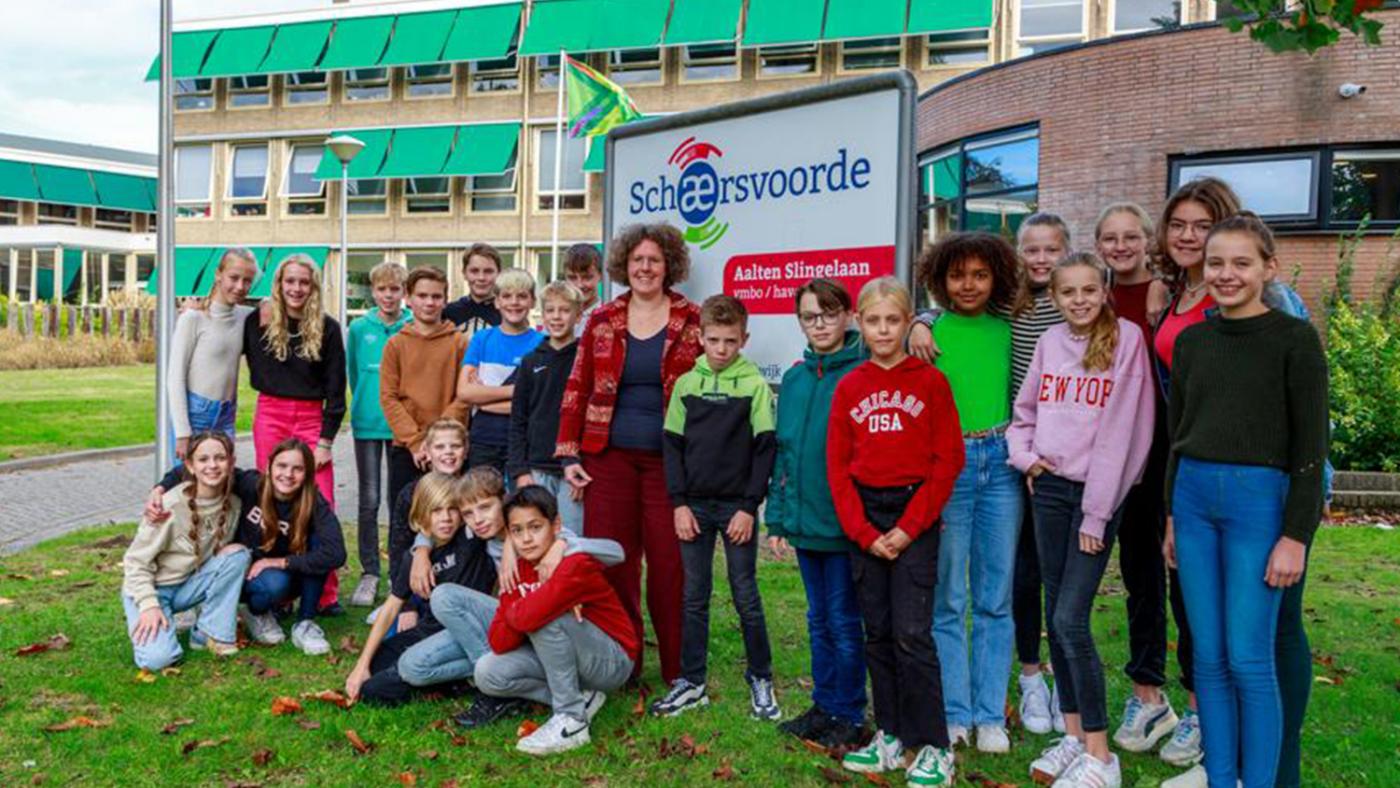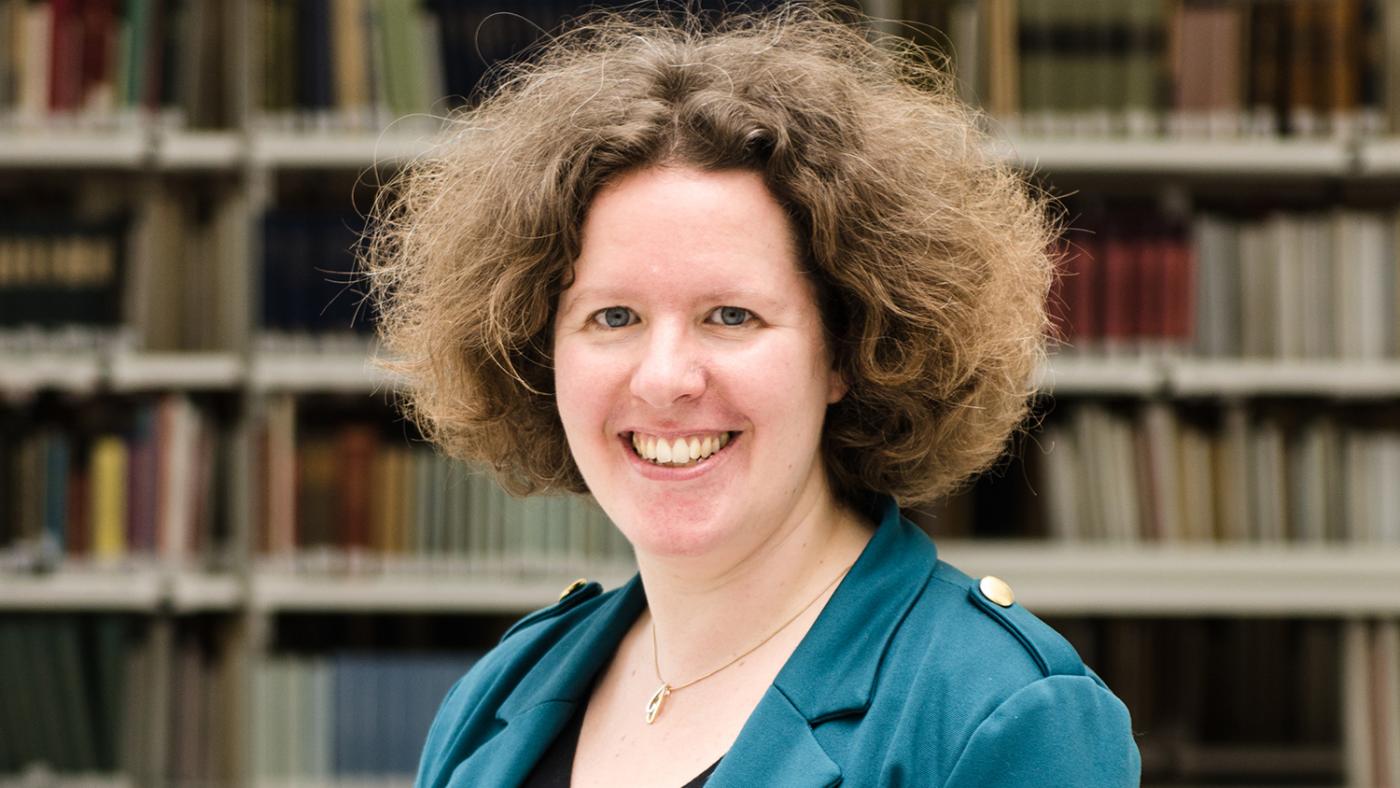A sudden U-turn
Why prominent cold war scholar Laurien Crump left UU to be a school principal

When DUB spoke with Laurien Crump in March, she was the definition of a busy bee. She was an Associate Professor in the History of International Relations and was about to transition from the position of Cluster Chair at University College Utrecht (UCU) to Head of History of International Relations at UU’s History & Art History department, where she would lead over 50 people. Meanwhile, her phone was ringing incessantly with journalists asking her to comment on the war in Ukraine. She was constantly travelling between Utrecht (where she rented a room), Hilversum (where most TV studios are), and her home in Achterhoek, an area in the East of the Netherlands, near the German border. There, she shares a home with her husband and her child, Tommy (8), who is mentally disabled and requires intensive care.
Now, she is still a busy bee but has given up all the crisscrossing to live and work in Achterhoek. Since September, she’s responsible for a secondary school with four locations spread over three villages, looking after 260 staff members and approximately 1,600 pupils. A pretty challenging position: “Since the nearest school is 15 kilometres away, we have to offer everything at the highest possible level because there is no other choice of school”, she says. That requires close-knit liaisons with the municipality and other organisations.
This is not a completely new environment for Crump: she worked at secondary schools for a decade before starting her dual PhD and teaching track at UU twelve years ago. Although she very much enjoys the leadership aspect of her new role, she misses her research dearly. “It feels like I’ve amputated a limb – or perhaps two,” she reveals, a little choked up. She hopes to have the option to go back to academia someday but, for this to be possible, UU’s intention to recognise and reward scientists on more than just the number of publications will have to be a reality already. “I hope that, someday, Recognition & Rewards will be taken so seriously that someone like me from outside would be of interest to academia.”
Why did you decide to make such a drastic change?
“It wasn’t something I had anticipated or planned but a few things happened at the same time, which led me to several considerations. Renting a room in Utrecht was convenient work-wise but I was missing a lot of things back home. I had several months of working 16 hours a day because of the media appearances, which wasn’t sustainable in the long run.
“Apart from my desire to work closer to home, I also felt a commitment to returning something to the community that made Tommy’s life worth living. In addition, I considered the forthcoming changes in my career. Even though I was honoured to be offered the role at the History Department, I thought: ‘it’s better to leave now than invest time and energy in a new section and then make people unhappy’. At the time, I was finishing my Veni grant, and the last deadline for a Vidi would have been in early October. It was communicated to me quite clearly that a determining factor for the development of my career would be to have PhD students, which means applying for funding. So, even though everything was going very well, I felt a bit in a bind.
“If I focused on Ukraine, which I wanted to do, because I feel a deep commitment to public engagement, especially in such insecure and bewildering times, that might have come at the expense of obtaining funding. The same applied to leading such a big section, which I wanted to prioritise because I find it so important to do it well. But, career-wise, that too seemed secondary to supervising PhD students. I am very enthusiastic about the concept of Recognition & Rewards, but to some extent, it still seems like a paper tiger to me.
“That’s when I realised there are leadership roles outside the university too. I thought: ‘it’s now or never’. If I embarked on a Vidi or a new book project – I had been approached by several publishers to write about Ukraine – it would be almost impossible to leave academia. You can’t quit halfway through a Vidi because the people in your project become unemployed. A book contract is legally binding as well.
“It was pure serendipity that I found this new job. I took a look at the website Meesterbaan and this vacancy showed up, half an hour away from my house. I doubted whether I should apply or not until the very last moment. Then I thought: ‘let’s just write a motivation letter and see what happens’ and the letter sort of wrote itself. I could immediately visualise the steps I would take as a principal.”

How did your colleagues and peers react to the news?
“They really didn’t see it coming. Some people were very upset. I felt awful. I’d already made my cluster at UCU unhappy by leaving it, and I didn’t want to make another team unhappy, although I am sure they are also thriving without me.
“I also had an extensive international network and my colleagues from abroad were incredibly upset. I got emails asking me to ‘please reconsider’ or ‘please stay in touch with academia’.
“Finally, there were the journalists – some of whom had become close acquaintances. They started calling me again on a daily basis after a rather tranquil summer. I never had to say so many noes in my entire life.
“I have the feeling that I’m letting people down and that is the most difficult part.”
But are you letting yourself down?
“That’s a very hard question. I enjoy my new job very much. I am working in an environment where I can put my ideals about leadership into practice and ensure that people are recognised and thrive. My job is immensely rewarding and I am touched by the warm welcome and enthusiasm of my new colleagues. But, at the same time, it also feels as though I’ve amputated a limb – or perhaps two. My research was part of me and it was thriving in all respects. I look at my library now and I feel guilty because it’s like all those books are staring at me. It will probably take time to shed the feeling of guilt.
“It also feels a bit ironic to leave now. When I started on my PhD on the Warsaw Pact, people thought I was nuts. ‘Eastern Europe? Cold War? Military history? Classical Diplomacy? That’s so out of fashion! Why on earth are you doing that?’ It almost seemed like a one-way route to unemployment. Today, the world we live in is all about Eastern Europe, military history and diplomacy.
“Back then, I felt at ease trading secondary education for the university because I knew I could go back any day, whereas now I feel pressured: if I ever want to go back, will that even be possible?”
So you still envision a future in academia?
“I hope to work for a good amount of time in my new job – at least a generation of pupils, if not more. I feel a strong commitment to the school, the teachers and the support staff as well as the pupils and their parents. I want to turn the school into a place where everyone feels happy, safe and stimulated, and make sure to get the social engagement that the school is now lacking, improving our pre-university stream and turning it into a much more outward-looking institution. Once that succeeds, I wouldn’t rule out a future in academia. I wouldn’t mind a yo-yo career.
“Let’s hope that Recognition & Rewards is a reality by then. Let’s also hope that having a disabled child is seen as being diverse. Usually, when people talk about diversity and inclusion at the university, this is not really remembered as a category. But there are so many things that I can’t do because of it: I can’t go to conferences all the time, for example. I also have to spend a considerable amount of time at home doing things like changing nappies and helping Tommy to get dressed or even to make sense of life in general. I have a permanent lack of sleep because Tommy has trouble sleeping. This is not considered in the entire funding scheme and is hardly talked about, which is why a lot of parents with disabled children drop out of their careers entirely.
“All the discussions about diversity are incredibly important but I hope diversity will be interpreted in a broader sense because that would have made a lot of difference for me. I hope both diversity and inclusion and Recognition & Rewards are interpreted in the broadest sense possible.”
Any advice for other academics considering a drastic change in their careers?
“It’s good to realise that the university is not the centre of the universe. There are a lot of people and organisations out there with challenges to work on, where you can put your skills to good use. In some respects, I have learned much more in the last two months than I have in years.
“I really enjoyed my time at UU but, in academia, it’s so easy to get caught up in a rat race: ‘What is the next deadline for the next funding trajectory?’
“I’d also like to give universities a piece of advice: be still more open to the outside world. The university would gain a lot by hiring people with outside experience. I have been very impressed with the professionalism in my new working environment. It should be easier for people to move between different organisations and the university. Societal impact is a two-way road: it’s not just about us impacting society but also about society impacting us.”